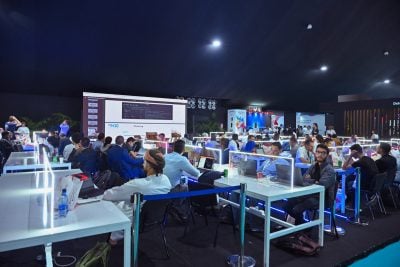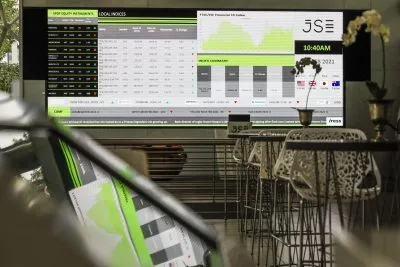Trading volumes at the Nairobi Securities Exchange were already low at the beginning of the year when Covid-19 hit Kenya, so it was reasonable to expect further depression. But, as CEO Geoffrey Odundo says in this interview, a pleasant surprise was in store.
What has been the impact of Covid-19 on NSE operations?
To our surprise, Covid-19 presented an opportunity for new investors to come in and we saw trading volumes rising beyond our expectations.
For example, our equity market trading turnover in the month of March alone was about $190m compared to $120m in the previous year. This trend extended to the month of April too.
This is due to the attractive prices presented by the market and good dividend yields announced by companies reporting their 2019 results, with some yields as high as 10%, competing effectively with T-bills.
The other success story following the impact of Covid-19 is the seamless transition to a fully automated environment. For years, we had been building a Business Continuity Plan and models; Covid-19 has thrown us deep into the real-life situation of implementing the plan.
So, currently, we are operating fully remotely from the start to end of each trading day, including surveillance, monitoring and reporting. Our brokers are also able to trade remotely through the VPN access we have provided.
Take us through the NSE debt market, what is the breakdown between government debt and corporate bonds?
Our debt market is composed of three aspects: First, there is the sovereign/government debt, which constitutes close to 90% of our total outstanding debt trading on the market.
One of the milestones we have achieved is the establishment of a relatively reliable and transparent yield curve. Players who are investing in this market are able to price off this curve.
Second, there is the corporate debt market that takes a large share of the remaining debt market. In this space we are proud to say that we are one of the leading markets in Africa.
Third, there are the green bonds – the first of which was launched this year.
Overall, the total value of our outstanding debt market is in the region of $190m.
How successful has the M-Akiba bond been and what can we learn from this?
M-Akiba is a retail bond launched three years ago; the first tranche has already matured and the second one matures in September, but its adoption has been slower.
In the initial issuance, we did a demonstration issue of $1, and it was taken up within eight days, showing its success. But when we did a bigger issue, we experienced uptake challenges arising from knowledge gaps about the product.
In response, we brought small tranches in every subsequent issue so as to build an understanding through a lot of market sensitisation programmes and we managed to fill up the full issue.
M-Akiba is a unique private-public initiative whose main objective is financial inclusion; raising money is the secondary objective. So, we designed a product structure never seen before where the customer experience, from on-boarding, to selecting a preferred broker, to buying the bond are all seamless and easy.
The register of participants demonstrates a wide geographical and demographic spread that is impressive. We had a tally of more than 300,000 registered account holders, though the active ones who bought were less than 10,000. But the number of registered accounts on the M-Akiba programme attests to the fact that we were able to enhance financial inclusion.
The equities markets is quite vibrant. Where do you see future listings coming from?
First, the Ibuka programme, which started in 2017 and came about from government challenging us to provide alternative capital raising opportunities for SMEs, to reduce the crowding-out in the banking sector.
[Editor’s note: Ibuka is a Swahili word meaning ‘to emerge’. The programme seeks to end a prolonged listing drought at the bourse by taking small and medium-sized companies through a 10-month incubation period. It is designed around hosting on non-trading boards; these are the Incubator Board and the Accelerator Board.]
When we conducted our research into why SMEs were showing little interest in coming to the capital market, we discovered that there was a mistaken belief that a company could only go to the market when its books of account and corporate structure were ready.
Another challenge was that SMEs believed the market was more elitist and not for them.
So, we created a platform where SMEs come in and are taken through a learning process by consultants. The aim is to make them investor ready.
With the programme, we are creating two things: one is a pipeline for future listings and the second an avenue for people to explore capital market financing.
So far, the programme has been a success. There are now 25 companies on the platform across all sectors, including an entertainment business, insurance brokerage and a family-owned supermarket chain store, among others.
A number of them are doing pre-IPO capital raising and some are having their own placements. Our intention is now to get conversion from Ibuka to one of the platforms we offer – from the main listing to alternative listing and Gems listing.
Also, government should [seek] to raise capital to finance their programme. Some years back, government used the market in its privatisation programme, which saw companies like Safaricom come in. This should still be going on because it not only raises revenue for the government, it offers Kenyans an opportunity to own their enterprises. We are engaging the government to have it list many of its enterprises on the exchange.
This sector is sitting on almost $20bn in available capital, the pension sector alone is growing at an average of $3bn a year and has almost $17bn; then there are life funds and investment schemes.
The NSE launched the derivatives market last year, how has its performance been so far?
Last year, we set up Africa’s second derivative market – after the Johannesburg derivative market that was established 20 years ago. Today we offer six all equity contracts – one an index contract based on our NSE 25 index and the rest are referenced on our blue-chip companies.
At the end of last year, we traded volumes of almost $200,000 whilst this year we have traded around $130,000. All these contracts are highly retail and we are yet to see institutional trades coming in.
The issue now is about uptake, which we are working on. We believe the derivative market will be a game-changer when people adapt to it.
Where do you see the NSE in the next five years?
Our strategic plan that expired last year in December had aimed at increasing turnover, pushing for more trading velocity and increasing market capitalisation to GDP.
The new strategic plan builds on that foundation and its mission and strategy is to simply link opportunity to capital, repositioning the NSE as a leading player on the continent, in a global space.
Last year we were voted the best frontier market by the MSCI World Index.
Want to continue reading? Subscribe today.
You've read all your free articles for this month! Subscribe now to enjoy full access to our content.
Digital Monthly
£8.00 / month
Receive full unlimited access to our articles, opinions, podcasts and more.
Digital Yearly
£70.00 / year
Our best value offer - save £26 and gain access to all of our digital content for an entire year!

 Sign in with Google
Sign in with Google 





